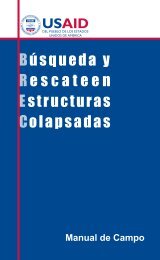Humanitarian Supply Management and Logistics in the Health Sector
Humanitarian Supply Management and Logistics in the Health Sector
Humanitarian Supply Management and Logistics in the Health Sector
You also want an ePaper? Increase the reach of your titles
YUMPU automatically turns print PDFs into web optimized ePapers that Google loves.
Chapter 4: Coord<strong>in</strong>ation 29<br />
One of <strong>the</strong> most awkward diplomatic tasks is to refuse an offer of aid<br />
outright. Sometimes, after consultations have been made, local decisionmakers<br />
may determ<strong>in</strong>e that <strong>the</strong> supplies offered would be useless, dra<strong>in</strong><strong>in</strong>g<br />
energy <strong>and</strong> resources away from <strong>the</strong> distribution of more effective<br />
assistance. Recipient countries should feel free to reject, with all due<br />
courtesy, such offers <strong>and</strong> to provide guidance to potential donors about<br />
<strong>the</strong> types of assistance that would be more appropriate <strong>in</strong> <strong>the</strong> circumstances.<br />
In practice, every donation has a cost for <strong>the</strong> recipient s<strong>in</strong>ce f<strong>in</strong>ancial<br />
<strong>and</strong> human resources are required for stor<strong>in</strong>g <strong>the</strong> supplies, transport<strong>in</strong>g<br />
<strong>the</strong>m, <strong>and</strong> all too frequently discard<strong>in</strong>g those that are <strong>in</strong> poor condition<br />
or are o<strong>the</strong>rwise unusable.






